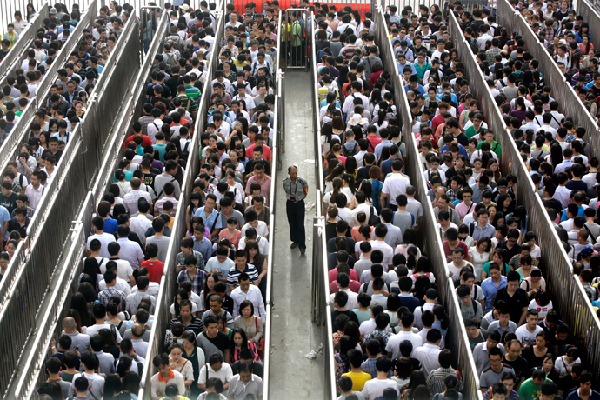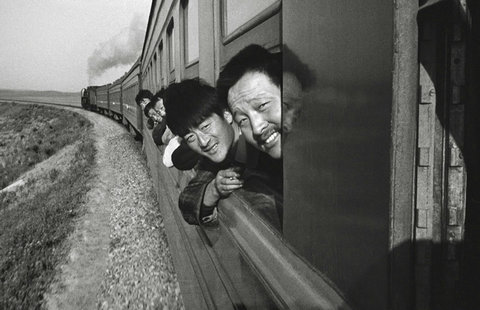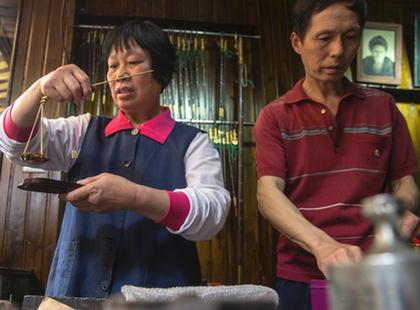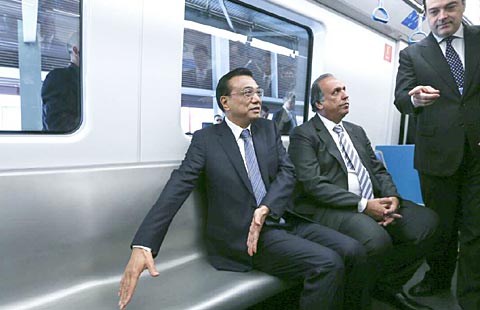More than half of Beijingers live outside the city
Updated: 2015-05-22 09:45
(CRIENGLISH.com/Xinhua)
|
|||||||||
 |
|
A security officer stands guard as passengers line up and wait for a security check during morning rush hour at Tiantongyuan North Station in Beijing, May 27, 2014. [Photo/Agencies] |
Beijing Bureau of Statistics says that the city has seen a steady decline in the growth rate of permanent residents in the city in the past five years.
Changes in major industries, relocation of certain non-administrative functions outside the capital, rise of living and commuting costs have been cited as the main factors for the decline.
Around 57% of permanent residents in Beijing live between the third ring road and the sixth ring road. About half of them live in residential areas outside the fifth ring road in Beijing.
Beijing had a permanent residential population of over 21.5 million people by the end of 2014, including more than 8.1 million permanent living migrants from other cities.
The growth rate of migrants living permanently in Beijing has seen a rapid decline in recent years from 64.2% in the past three years to 43.5% in 2014.
The report also says that the burden on the city center is gradually being transferred to the city's new development zones.
But public services like schools, hospitals and other services are still concentrated in the city center. The uneven distribution of these public resources has led to congestion and environmental issues.
Related: Beijing to ease residency permits for migrants
Beijing will pilot a "point system" in east suburban district of Tongzhou to allow its migrants to claim permanent resident permits or "hukou".
The system was included in the comprehensive pilot plan for promoting new-type urbanization released Wednesday by the National Development and Reform Commission (NDRC), China's top economic planner.
According to the district government of Tongzhou, it will adopt a "point system" for migrant people in the district based on various criteria including stable employment, accommodation, social security, and duration of residency, etc.
Migrants can transform their household registration status to local residents after reaching a required amount of points. The authorities have yet to disclose more details.

 Journey of a migrant girl from village to ad world
Journey of a migrant girl from village to ad world
 Photographer captures Chinese on the train
Photographer captures Chinese on the train
 Hou Hsiao-Hsien's The Assassin premieres in Cannes
Hou Hsiao-Hsien's The Assassin premieres in Cannes
 Top 10 highest-paid white-collar jobs in China
Top 10 highest-paid white-collar jobs in China
 The dying craft of balance scales
The dying craft of balance scales
 Culture Insider: Six things you may not know about Grain Buds
Culture Insider: Six things you may not know about Grain Buds
 Premier Li rides on new China-made train in Rio de Janeiro
Premier Li rides on new China-made train in Rio de Janeiro
 NYC's new One World Observatory offers sweeping views of Manhattan
NYC's new One World Observatory offers sweeping views of Manhattan
Most Viewed
Editor's Picks

|

|

|

|

|

|
Today's Top News
Li: 'Great potential' for Sino-Colombian ties
Beijing responds to surveillance by US plane
Beijing sets out its rights after reports of incursion
China may have edge in race to build California's bullet train
US Senate votes to move forward fast-track trade legislation
Colombia runs into infrastructure bumps on road to prosperity
Premier Li arrives in Bogota to start official visit to Colombia
China is a global leader in renewable energy: Panel
US Weekly

|

|







